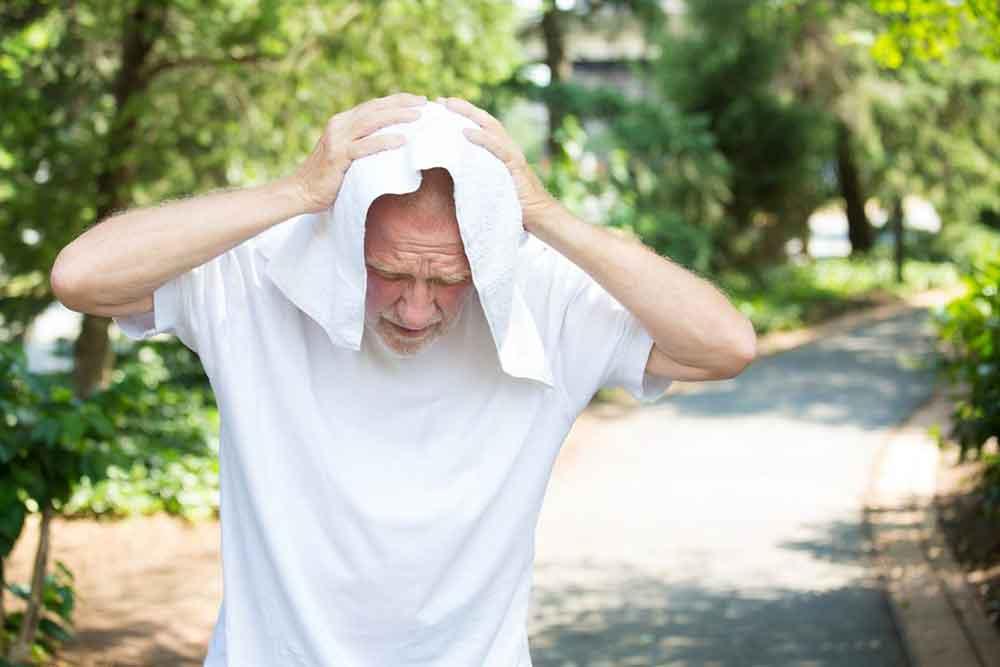4 Tips for Fighting Heat Exhaustion in Houston

The risk of suffering from heat exhaustion rise as the summer progresses and the temperature is at a constant high. With the heat still high in Houston, we’re all at risk to some extent. Understanding just what heat exhaustion is and how to combat (or avoid) it can help keep you comfortable in hot weather and even, in some circumstances, save a life.
Tip 1: Understand What Heat Exhaustion Is
Excessive heat is bad for the body, and as the temperature rises we can go through a range of suffering that begins with a heat rash or prickly heat, moves on to heat cramps, through to heat exhaustion, and eventually to heatstroke. Heat stroke is life threatening, so it’s vital that heat exhaustion is recognized and treated before it progresses to the next stage.
When anyone is working or exercising in a hot environment, the body finds it more difficult to regulate its internal temperature. This is especially true when humidity is high along with heat since humid conditions make it harder for the body to lose heat through sweat evaporation. Often, dehydration accompanies heat exhaustion because we haven’t drunk enough fluid to adequately replace the water lost through sweating.
Tip 2: Recognize the Symptoms
Heat exhaustion is far more serious than simply feeling hot and sticky, and has many more debilitating symptoms. These include:
- Nausea or actual vomiting
- Feeling weak and lightheaded
- Having a headache
- Experiencing muscle cramps
The elderly and the very young are particularly vulnerable to heatstroke since their bodies are less able to get rid of excessive heat. A common mistake is to leave children in cars on hot days. It’s thought that almost 40 children die each year in this way. Even with the windows rolled down an inch or two, the temperature can rise by 20 degrees or more in just a few minutes.
Tip 3: Know How to Treat Heat Exhaustion
- The first action is to get the affected person out of the heat. This could involve taking them into an air-conditioned environment (which could include a vehicle as well as a building), or simply out of direct sunlight and into a more shaded place.
- Tight clothing should be either loosened or removed so that air can circulate more freely across the skin.
- Ice packs (even cold drinks cans), wet towels or cloths or misting the skin with water can help reduce temperatures and bring relief.
- The person suffering from heat exhaustion is likely also dehydrated, so drinking water is important, but may be difficult if they’re also suffering from nausea or vomiting. If this is the case, encourage small sips with a space between each one rather than gulping down too much at once. If it’s impossible for the person to drink, it may be necessary to call for emergency services, as giving intravenous fluids may be the only option.
- If pain from muscle cramps persists, these can be treated with regular, over the counter medications such as ibuprofen or Tylenol.
Tip 4: Understand Prevention
Wear light colored clothes as these reflect heat away, whereas dark colors absorb heat. Keep clothing light and loose so air can freely circulate and aid sweat evaporation. Try to avoid the temptation to remove too much clothing since exposed skin puts you more at risk from heat exhaustion. This is especially relevant to men working outside during hot weather.
Remember your sunscreen. Look for creams with a 30 or higher SPF, and protect your face with a brimmed hat and sunglasses. If you allow your skin to burn, it’s less able to regulate heat in your body.
Drink plenty, but avoid alcohol or caffeine drinks. Plain water is best. Most of us make the mistake of not drinking until we’re thirsty, but thirst is a sign of dehydration so it’s best to sip constantly through the day and avoid feelings of thirst.
Stay out of the heat as much as possible. Going outside into the heat is unavoidable for most of us, but staying in air-conditioned environments helps minimize the chances of developing heat exhaustion. Those who work outside are especially at risk, and it’s important that employers recognize this and have procedures in place to protect employees.
Don’t overwork. Even a shopping trip in hot weather can be too much exercise for the body during the hottest times. Take regular breaks in cool places, have a cool drink and allow the body to recuperate a little before carrying on. It’s also advisable to avoid working out in hot weather. Reschedule exercise sessions for earlier or later in the day when at all possible.
Hot, Houston summers are glorious, and we want to help you enjoy them without mishap. Take care in the sun so you stay healthy to make the most of every day.




